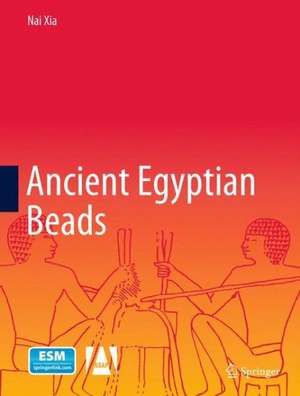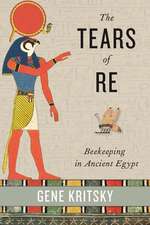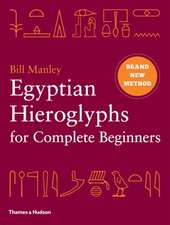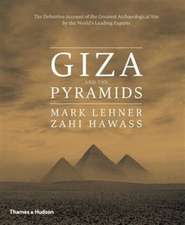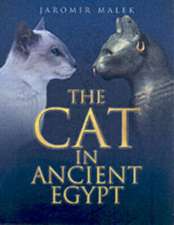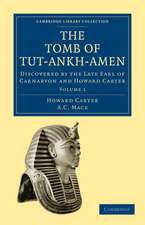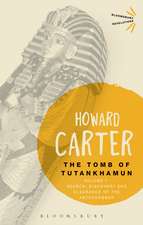Ancient Egyptian Beads
Autor Nai Xiaen Limba Engleză Hardback – 20 iun 2014
The book first discusses the archaeological value of beads and the method employed in the study of them, especially emphasizing the importance of the technique of bead-making for dating purposes. It then examines and evaluates various schemes for the classification of beads. The book goes on to propose a new classification system and works out a comprehensive corpus of beads with the aid of sixteen plates.
Next, the book features a chronological survey that details the material, typology (including the technical peculiarities), use, arrangement and pictorial representation of beads throughout the nine divisions or periods of Ancient Egyptian history. This survey points out the characteristics of each period as well any contact Egypt may have experienced with foreign countries as shown by the beads. It also corrects much wrong identifications of materials and mistaken datings.
This book is based on the Ph.D dissertation written by pioneering Chinese archaeologist Xia Nai when he studied in London College University some 70 years ago and who had direct access to considerable firsthand resources at the forefront of Egyptology research. It represents a crucial and long-awaited advance in archaeology, not only for Egypt but for the study of the past across Africa and beyond.
| Toate formatele și edițiile | Preț | Express |
|---|---|---|
| Paperback (1) | 727.31 lei 6-8 săpt. | |
| Springer Berlin, Heidelberg – 4 mai 2017 | 727.31 lei 6-8 săpt. | |
| Hardback (1) | 646.16 lei 38-44 zile | |
| Springer Berlin, Heidelberg – 20 iun 2014 | 646.16 lei 38-44 zile |
Preț: 646.16 lei
Preț vechi: 850.22 lei
-24% Nou
Puncte Express: 969
Preț estimativ în valută:
123.66€ • 127.75$ • 102.91£
123.66€ • 127.75$ • 102.91£
Carte tipărită la comandă
Livrare economică 22-28 martie
Preluare comenzi: 021 569.72.76
Specificații
ISBN-13: 9783642548673
ISBN-10: 3642548679
Pagini: 188
Ilustrații: XIII, 173 p. 20 illus.
Dimensiuni: 210 x 279 x 16 mm
Greutate: 0.64 kg
Ediția:2014
Editura: Springer Berlin, Heidelberg
Colecția Springer
Locul publicării:Berlin, Heidelberg, Germany
ISBN-10: 3642548679
Pagini: 188
Ilustrații: XIII, 173 p. 20 illus.
Dimensiuni: 210 x 279 x 16 mm
Greutate: 0.64 kg
Ediția:2014
Editura: Springer Berlin, Heidelberg
Colecția Springer
Locul publicării:Berlin, Heidelberg, Germany
Public țintă
ResearchCuprins
Part One Introduction.- Archaeological Value of Beads.- Scope of Study.- Method of Registration.- Mode of Treatment.- Nomenclature and Identification of Materials.- Part Two Technical methods of Bead-Making.- Glass Beads.- Stone Beads.- Beads of Pasty Material.- Metal Beads.- Beads of Miscellaneous Materials.- Part Three Classification and Corpus.- Part Three Classification and Corpus.- Principle of Classification.- A New Classification.- Principle of A Corpus.- A New Corpus.- Part Four Chronological Survey.- Prehistoric Period.- Early Dynastic Period.- Old Kingdom.- First Intermediate Period.- Middle Kingdom.- Second Intermediate Period.- New Kingdom.- Late Period.- The Greco-Roman Period.- Bibliography.
Textul de pe ultima copertă
This book presents a detailed analysis and thorough study of the unique collection of Ancient Egyptian beads in the Petrie Museum of Egyptian Archaeology in London.
The book first discusses the archaeological value of beads and the method employed in the study of them, especially emphasizing the importance of the technique of bead-making for dating purposes. It then examines and evaluates various schemes for the classification of beads. The book goes on to propose a new classification system and works out a comprehensive corpus of beads with the aid of sixteen plates
Next, the book features a chronological survey that details the material, typology (including the technical peculiarities), use, arrangement and pictorial representation of beads throughout the nine divisions or periods of Ancient Egyptian history. This survey points out the characteristics of each period as well any contact Egypt may have experienced with foreign countries as shown by the beads. It also corrects many wrong identifications of materials and mistaken datings.
This book is based on the Ph.D dissertation written by pioneering Chinese archaeologist Xia Nai when he studied in London College University some 70 years ago, and who had direct access to considerable firsthand resources at the forefront of Egyptology research. It represents a crucial and long-awaited advance in archaeology, not only for Egypt but for the study of the past across Africa and beyond.
The book first discusses the archaeological value of beads and the method employed in the study of them, especially emphasizing the importance of the technique of bead-making for dating purposes. It then examines and evaluates various schemes for the classification of beads. The book goes on to propose a new classification system and works out a comprehensive corpus of beads with the aid of sixteen plates
Next, the book features a chronological survey that details the material, typology (including the technical peculiarities), use, arrangement and pictorial representation of beads throughout the nine divisions or periods of Ancient Egyptian history. This survey points out the characteristics of each period as well any contact Egypt may have experienced with foreign countries as shown by the beads. It also corrects many wrong identifications of materials and mistaken datings.
This book is based on the Ph.D dissertation written by pioneering Chinese archaeologist Xia Nai when he studied in London College University some 70 years ago, and who had direct access to considerable firsthand resources at the forefront of Egyptology research. It represents a crucial and long-awaited advance in archaeology, not only for Egypt but for the study of the past across Africa and beyond.
Caracteristici
Presents a detailed analysis and thorough study of the unique collection of ancient Egyptian beads in the Petrie Museum of Egyptian Archaeology in London Based on the Ph.D dissertation written by pioneering Chinese archaeologist Xia Nai when he studied in London College University some 70 years ago Proposes a new classification system, which affords a better basis for the further advancement of the study of this subject Represents a crucial and long-awaited advance in archaeology, not only for Egypt but for the study of the past across Africa and beyond Includes supplementary material: sn.pub/extras
